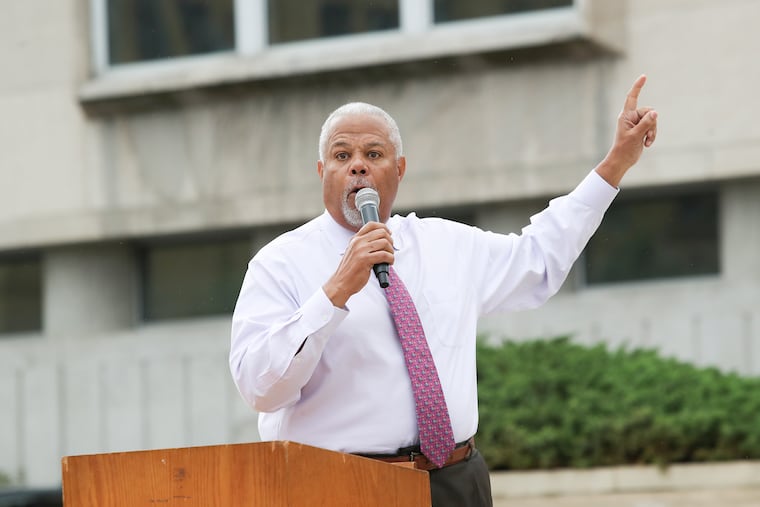Philly is down 9 judges, and some officials say the city got snubbed in a deal to fill seats elsewhere
Lawmakers in the state Senate are poised to approve judicial vacancies in 10 counties next week. Philadelphia — which has the most open judicial seats of any county — isn't one of them.

Less than a month into the new year, a routine process is causing a squabble in Harrisburg, with some Philadelphia officials expressing frustration over a slate of judges who are set to be appointed next week.
The dustup comes after a bipartisan group of lawmakers struck a deal to fill vacancies on courts across 10 Pennsylvania counties. But Philadelphia — which has the largest court system in the state, and where nine judicial seats are empty — isn’t one of them.
Several members of Philadelphia’s delegation to Harrisburg are concerned the city was left out of the deal, and the city’s bar association says long vacancies in the Common Pleas Court have had a cascading effect on a stressed system. Seven of the court’s nine open judicial seats have been empty for more than a year.
State Sen. Anthony Hardy Williams, a West Philadelphia Democrat who has served in Harrisburg for more than 35 years, said Philadelphia’s exclusion from the slate of appointments sets a precedent that reduces the city’s influence in Harrisburg. He said legislative leaders advanced the slate without input from Philadelphia’s senators.
“This was a deal struck without the members of the Philadelphia delegation saying they’re OK with it,” Williams said. “This is an absolute dilution of our Philadelphia delegation’s power. … For us to not be included is an insult.”
Other lawmakers said there’s nothing out of the ordinary. The Senate considers slates of judicial appointees on a rolling basis. For example, the state Senate confirmed 10 judges in 2023, five of whom were in Philadelphia. No judges were appointed last year.
A spokesperson for Senate Minority Leader Jay Costa (D., Allegheny) declined to comment.
State Sen. Nikil Saval, a Democrat who chairs the Philadelphia delegation, said he is hopeful the city’s vacancies will be filled in a future appointment package.
Judicial vacancies are nothing new, as judges retire or are appointed to higher courts. To fill open seats outside of election season, Pennsylvania Democratic and Republican leaders typically work with the governor’s office to advance a slate that satisfies both parties. The governor appoints nominees to fill judicial and county row-office vacancies, who then must be approved by a two-thirds vote in the Senate, requiring bipartisan cooperation. (Magisterial district court judges outside Philadelphia require only a majority vote.)
An appointed judge fills the remainder of a predecessor’s 10-year term or serves until after the next municipal election, whichever is shorter. In Philadelphia, they make at least $228,400 per year.
» READ MORE: Justice delayed: Philly courts’ backlog leaves many jailed for months without a hearing
Philadelphia’s Common Pleas Court has the highest number of judicial vacancies of any court system in the state. The court — which is a trial-level court that handles serious crimes, cases involving children and families, and appeals from lower courts — should have 93 judges, but has been operating for months with 84.
The Philadelphia Bar Association, which has repeatedly called for lawmakers in Harrisburg to fill the vacancies, said in a statement that additional judges are needed “immediately” to relieve overcrowded schedules.
“We simply cannot afford to wait any longer,” said Katayun Jaffari, the chancellor of the Philadelphia Bar Association. “We, again, urge our leaders in Harrisburg and Philadelphia to rise above political concerns and work collaboratively to fill these vacancies.”
There are judicial vacancies in other counties, but no other Pennsylvania trial court is as understaffed as Philadelphia’s Common Pleas Court. Allegheny County is down six judges, but the package of appointments legislators are set to consider next week would fill three of those seats.
Every other county in the state has three or fewer judicial vacancies, according to a list provided by a spokesperson for the state courts system.
For Williams, excluding Philadelphia from any deal to fill judicial vacancies is a matter of reducing the city’s influence. He said he expressed his “extreme frustration” to Costa, who told him that Philadelphia was not included in the package because the delegation was not unified behind its nominees to fill the seats.
Williams said the discord may have come down to one nominee: Larry Farnese, a former state senator now vying for a judgeship in Philadelphia.
Some caucus members expressed discomfort with Farnese’s nomination — shades of 2023, when sources said a long-simmering feud with another Philadelphia state senator tanked Farnese’s chances of being appointed from a short list of nominees.
Farnese did not respond to a request for comment Thursday.
» READ MORE: Philly Democrats’ process of picking ‘magic seat’ judges involved mischief and vengeance this year
Despite the internal strife, Williams said the delegation had coalesced around its judicial nominees — including Farnese. He said the group learned the city was left out of the appointment package and submitted a letter to Costa saying its members were in agreement, but by then it was too late, and a deal had already been struck.
“This is not just about one judge,” Williams said. “This is about a process and precedent within the caucus. … I’m sounding an alarm because others need to understand if this precedent is established, that means we will go forward with this being normal. And it’s not.”